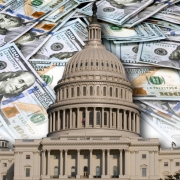When The Government Takes A Dollar From Your Pocket And Spends It, It Doesn’t Mean The Economy Grows By A Dollar.
When revenue shrinks by 1 percent of GDP and spending increases by 51 percent over 10 months, you get a $2.8 trillion deficit. That figure, according to the Congressional Budget Office, is significantly larger than the deficit Uncle Sam accumulated over the first 10 months of 2019. Yet, many in Congress demand that even more spending be enacted in the name of stimulating the economy.
More spending means more debt and more future taxes. That much we know. What we also know is that the calls for sustained spending—in the form of unemployment checks, individual stimulus checks, small-business grants, and payroll tax cuts—which are made regularly in newspapers, political speeches, and partisan punditry, are overblown to stay the least. The idea here is that if Uncle Sam continues paying people to stay home, their consumption will continue, and the economy will grow.
These calls are based explicitly or implicitly on the belief in an all-powerful federal spending multiplier, or the idea that if the government spends one dollar, the economy will grow by more than a dollar.




